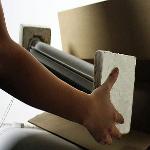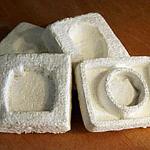17 August 2010

Photo: Ecovative Design
Ecocradle serves the same purpose as traditional foams when used as a packaging material.
Buying a product these days often means you are getting more than you bargained for.
Unwrapping your latest purchase can leave the room strewn with the cardboard, plastic and packing foam waste that kept your newest purchase protected until it reached the safety of your home.
That may soon change, however, with a new product that can be used as compost when its job as packaging is done.
Alternative to packaging foam
Packing foam is useful for only a few weeks or months before being tossed into the trash.
But after being thrown away, this petroleum-based material can survive for thousands of years in landfills. Now, there is an alternative to this wasteful practice: a new type of packing material that can be absorbed back into nature when its job is done.

Ecovative Design
Ecocradle can be used as compost when it is no longer needed for packaging.Eben Bayer is the CEO and cofounder of Ecovative Design, which manufactures Ecocradle, a natural packing alternative.
"We source agricultural waste from around the world. So we have a regionalized or localized manufacturing process. If you're in the United States in the South you might use rice husks. In upstate New York where we're based we use things like buckwheat husks."
Bayer explains that agricultural waste products become the bulk, or main body, of the packing material, which is held together by mushroom roots, or mycelium.
"So we take these seed husks, we wet them, we cook them, we put them in a mold. We then add a liquid slurry of these mushroom cells or mycelium. And then over five days, indoors, in the dark, they self-assemble, they grow into packaging parts."
Saving even more energy
Ecovative Design is also working on a new sterilization process that's key to the growth of the mushroom cells.
Bayer's business partner, Gavin McIntyre, developed a process that depends entirely on natural plant compounds that inhibit microbial growth. The compounds include oils from cinnamon-bark, thyme, oregano and lemongrass - and create an aroma that McIntyre likens to pizza. The process will reduce the amount of energy used by about one-fifth, meaning new versions of Ecocradle will use only one-fortieth the energy required to manufacture traditional foam packing materials.
This low-energy process will also free Ecovative Design from the traditional large scale manufacturing operations required by most packing companies. Instead, it hopes to locate its factories as close as possible to both its agricultural suppliers and its end-users. Bayer says this localized plan will save money and help the environment by reducing expensive transportation costs.
Happy customers
Steelcase, a global leader in the office furniture industry, recently switched from petroleum-based foam packaging to Ecocradle.
Dennis Carlson works with packaging design and development at Steelcase.
"What we found is that the Ecocradle materials that were being developed had very similar performance characteristics and, additionally, a very similar price-point."
Carlson says this switch was inspired by the company's desire to become more sustainable and environmentally friendly. It has already generated some positive feedback from their customers.?
"People find it very interesting that we've gone this route. It [Ecocradle] decomposes in 30-45 days which is a really big deal, and something that they haven't been able to do with the previous foams. And they like the fact that they can either put it into a landfill and it'll break down or throw it in their garden."
Just the beginning
But Ecovative Design has its eye on replacing products in other markets, as well.
For example, Bayer says the company is developing a product called Greensulate to provide an environmentally-friendly alternative to foam or fiberglass insulation.
"Ecovative is not just a packaging company. Packaging is the first application for our material because it's a really terrible idea to use a product that lasts 10,000 years for a couple weeks. So our vision is not just to help revolutionize the packaging market, not just to revolutionize the building market, but we really want to become one of the leaders in sustainable materials in this century."
In the process, Bayer says, his company hopes to inspire others to do business in a way that values a healthy planet at least as much as healthy profits.